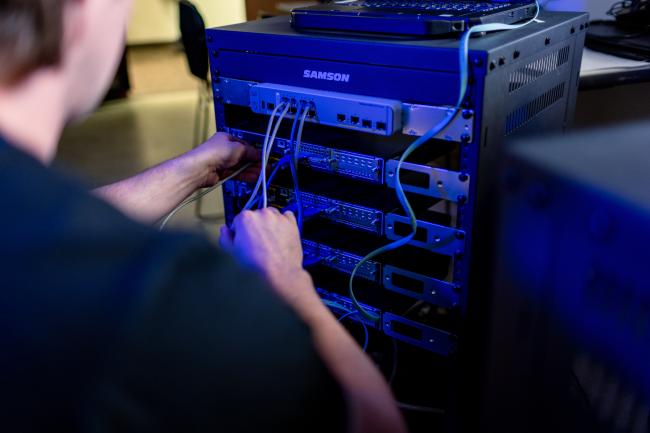Mission Statement
Prepare students to meet emerging security and technology career challenges, to ensure they are technologically skilled, perform professionally, and provide excellent services.
Overview
The Bachelor of Applied Science (BAS) in Digital Forensics and Analytics (DFA) program is a cutting-edge degree designed for graduates of applied associate's programs in Science, Technology, Engineering, and Mathematics (STEM) fields, such as IT Services and Cybersecurity, who are looking to advance their practical skills and pursue leadership roles in the rapidly evolving world of digital security and data analysis.
This program uniquely blends the critical skills of digital forensics with interdisciplinary knowledge from business, AI, and data analytics. You will gain expertise in identifying, collecting, and evaluating digital evidence, responding to security incidents, planning for risk, and managing digital assets. Furthermore, you will develop the business acumen and analytical capabilities necessary for effective data collection, presentation to stakeholders (including legal and business teams), and strategic decision-making.
A key focus of the DFA program is practical application through valuable internships and a culminating capstone experience, ensuring you graduate with real-world skills and a competitive edge.
What Will You Learn?
- Ethical Practices: Implement and practice ethically responsible standards and procedures in all aspects of digital forensics and analytics.
- Forensic Evidence Handling: Gather and evaluate the quality of forensic evidence sufficient for criminal judicial processes.
- Business Impact Analysis: Analyze digital systems and data to determine their impact on business operations.
- Risk Assessment: Assess legal, business, and technological risks within digital environments.
- Data-Driven Risk Management: Manage risk through data-driven assessment, planning, and application of security measures.
- Digital Forensics Expertise: Apply digital forensics investigation principles, techniques, and tactics to various scenarios.
- Cybersecurity Leadership: Develop, lead, and communicate valid cybersecurity practices and solutions to diverse audiences.
Who Can Enroll?
This program is designed for individuals who have:
- Successfully completed a Science, Technology, Engineering, and Mathematics (STEM) AAS degree with a minimum of 60 college-level credits. For example:
- The completed associate's degree must include a minimum of 15 credits of general education coursework.
Why Choose the DFA BAS Program?
- Build Upon Your Existing Skills: Seamlessly transition your applied associate's degree into a bachelor's degree focused on in-demand skills.
- Interdisciplinary Approach: Gain a unique blend of technical forensics expertise with crucial business and data analytics knowledge.
- Hands-On Experience: Benefit from required internships and a culminating capstone project for practical, real-world learning.
- Career Advancement: Prepare for advanced roles in digital forensics, cybersecurity analysis, incident response, and data-driven security management.
- Industry Relevance: The curriculum is informed by industry best practices and aligns with potential professional certifications.
Career Opportunities for Graduates:
Graduates of the DFA BAS program will be well-prepared for a variety of roles, including:
- Digital Forensics Analyst/Investigator
- Cybersecurity Analyst
- Incident Response Analyst
- Security Operations Center (SOC) Analyst
- Data Security Analyst
- E-discovery Analyst
- IT Auditor with a Forensics Focus
- Risk and Compliance Analyst
Application
The Digital Forensics and Analytics (DFA) program is competitive, with 20 seats available for each cohort per year. Admission to the program is offered on a first-come, first-served basis. To increase your chances of securing a spot in your preferred cohort, it is highly recommended that you submit your application, transcripts, and any required documentation as early as possible. Applications can be submitted here.
Program Pre-admission Requirement
Successful completion of a Science, Technology, Engineering, and Mathematics (STEM) AAS degree for a minimum of 60 credits for acceptance into the program. This includes completion of a minimum of 15 credits of general education coursework required for a bachelor's degree.
Examples of acceptable AAS programs to complete before acceptance into the DFA BAS:
- Information Assurance and Cybersecurity AAS
- Information Technology Services AAS
- Energy Systems Technology AAS
- Mechatronic Engineering Technology AAS
Program Structure
The DFA BAS program requires the completion of 120 total credit hours, including transfer credits from your associate's degree. The program is structured over four semesters of upper-division coursework, typically taken after completing your associate's degree.
Digital Forensics and Analytics (BAS)
Junior Year - Fall Semester
| Course Prefix | Course Title | Credits |
|---|---|---|
| ENG 102 | Writing and Rhetoric II | 3 |
| GEM 4 | Science Ways of Knowing | 3 |
| GEM 4(L) | Science Ways of Knowing Lab | 1 |
| BSN 101 | Introduction to Business* | 3 |
| DFA 300 | Intro to Digital Forensics | 3 |
| DFA 320 | Incident Planning and Response | 3 |
| Total | 16 |
Junior Year - Spring Semester
| Course Prefix | Course Title | Credits |
|---|---|---|
| GEM 4 | 2nd Science Ways of Knowing (New prefix required) | 3-4 |
| BSN 115 | Introduction to Business Applications | 3 |
| DFA 305 | Database Administration and Security | 3 |
| CNT 310 | Data Analytics Internship | 3 |
| CNT 315 | Database Management | 3 |
| Total | 15/16 |
Senior Year - Fall Semester
| Course Prefix | Course Title | Credits |
|---|---|---|
| GEM 6 | 2nd Social and Behavioral Ways of Knowing (Must have CRJ 103 or PHIL 103)* | 3 |
| BSN 255 | Leadership Development Skills* | 3 |
| Elective | Any Gen. Ed. Elective (Recommended ENGL 203)* | 3 |
| DFA 400 | Intro to Cyber Operations | 3 |
| DFA 415 | Device Forensics | 3 |
| Total | 15 |
Senior Year - Spring Semester
| Course Prefix | Course Title | Credits |
|---|---|---|
| GEM 5 | 2nd Human and Artistic Ways of Knowing (New prefix req.) | 3 |
| DFA 405 | Project Management | 3 |
| DFA 410 | Forensics Internship | 4 |
| DFA 490 | Forensics Analytics Capstone | 4 |
| Total | 14 |



 BACK TO PROGRAMS
BACK TO PROGRAMS
